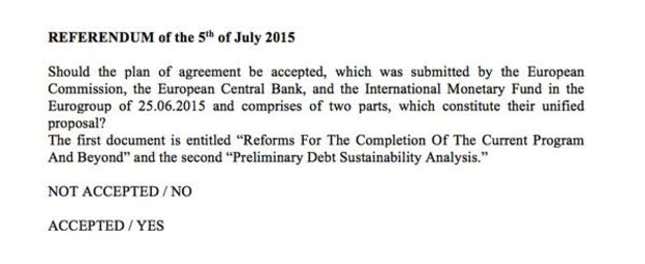Greeks head to the polls July 5 to vote in a referendum on whether the government should accept a proposed bailout. Rejection or acceptance of the deal, which would fund the flailing economy on the condition that Athens implement further austerity measures, has the potential to redefine Greece’s position in Europe, and ultimately the economic integrity of the entire European Union.
It seems like a relatively cut-and-dry choice: vote “yes” if you believe a bailout plus more austerity will save the country from further financial turmoil, vote “no” if you think the proposal overburdens an already weary Greece. The problem is, for many Greeks, it’s not that simple.
For one, the wording of the referendum is apparently quite convoluted. The BBC published a translation for those who can’t read Greek:

“For those who can’t speak Greekdebtspeak,” the BBC warns, “you’re on your own.”
Critics of the referendum have noted that the ballot structure, which places a box for “no” above the box for “yes,” could further confuse voters by restructuring the question away from the expected “accept or reject” dynamic, toward something along the lines of “Should the deal be accepted? Yes or no?”
Wording aside, the referendum as a whole is proving quite disorienting to even the most informed of Greek voters and international observers alike. The ballot asks them to approve or reject the terms of a bailout offer that European creditors say is “no longer on the table.”
The New York Times’s Suzanne Daley took to the streets of Athens to inquire ordinary Greeks as to their real-time understanding of the vote. “People coming out of the voting booths seemed split,” she reports.
One Athenian woman voted “yes,” believing the basis of the vote to be Greece’s future in the European Union. ““I believe when you are in a union you cannot leave,” she said. “We say in our country if the sheep leaves the flock it cannot live.”
Another was equally certain in her convictions, even if that certainty seemed based in a whole lot of uncertainty: “No, means that we don’t have to say yes to whatever they are saying,” she said.




